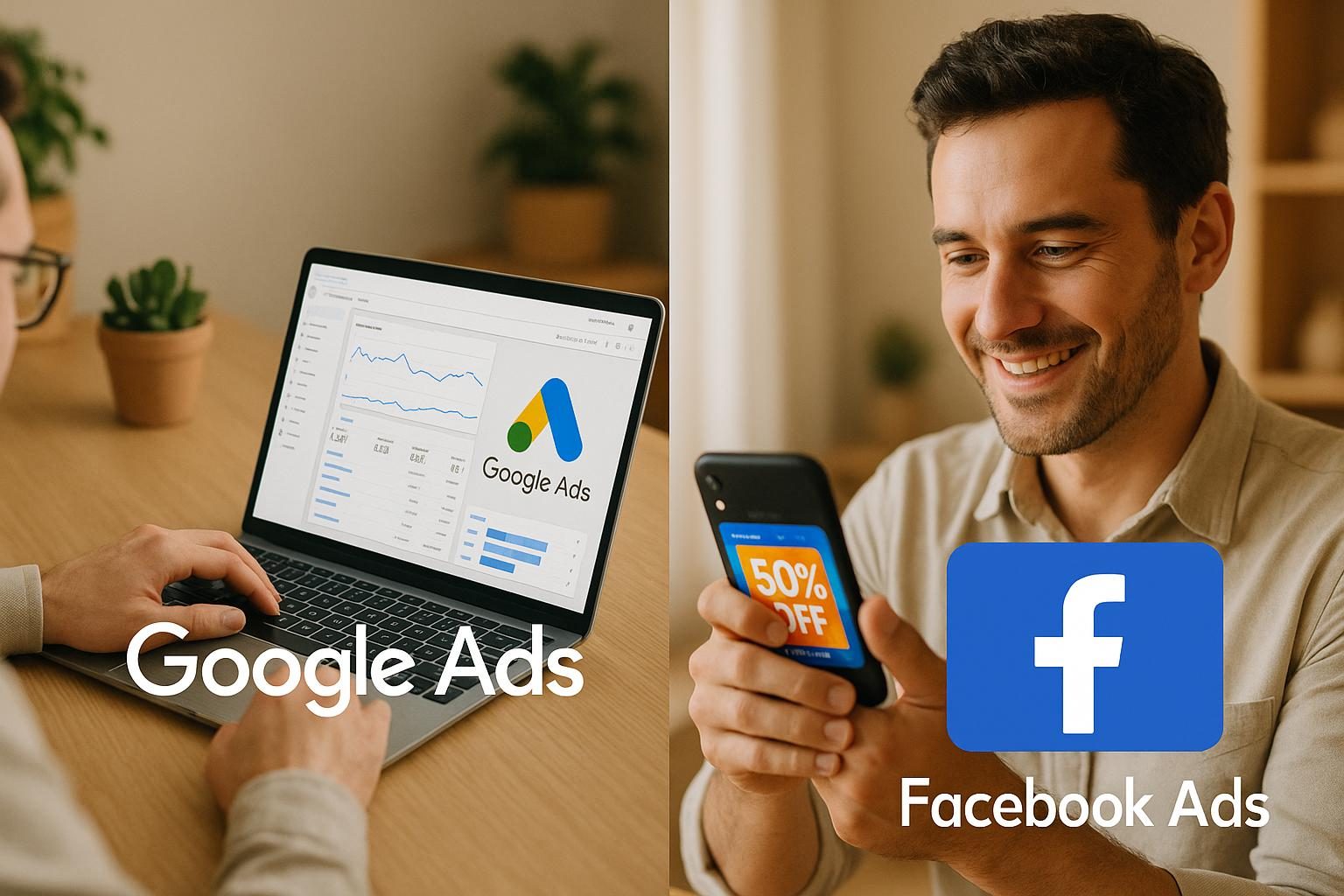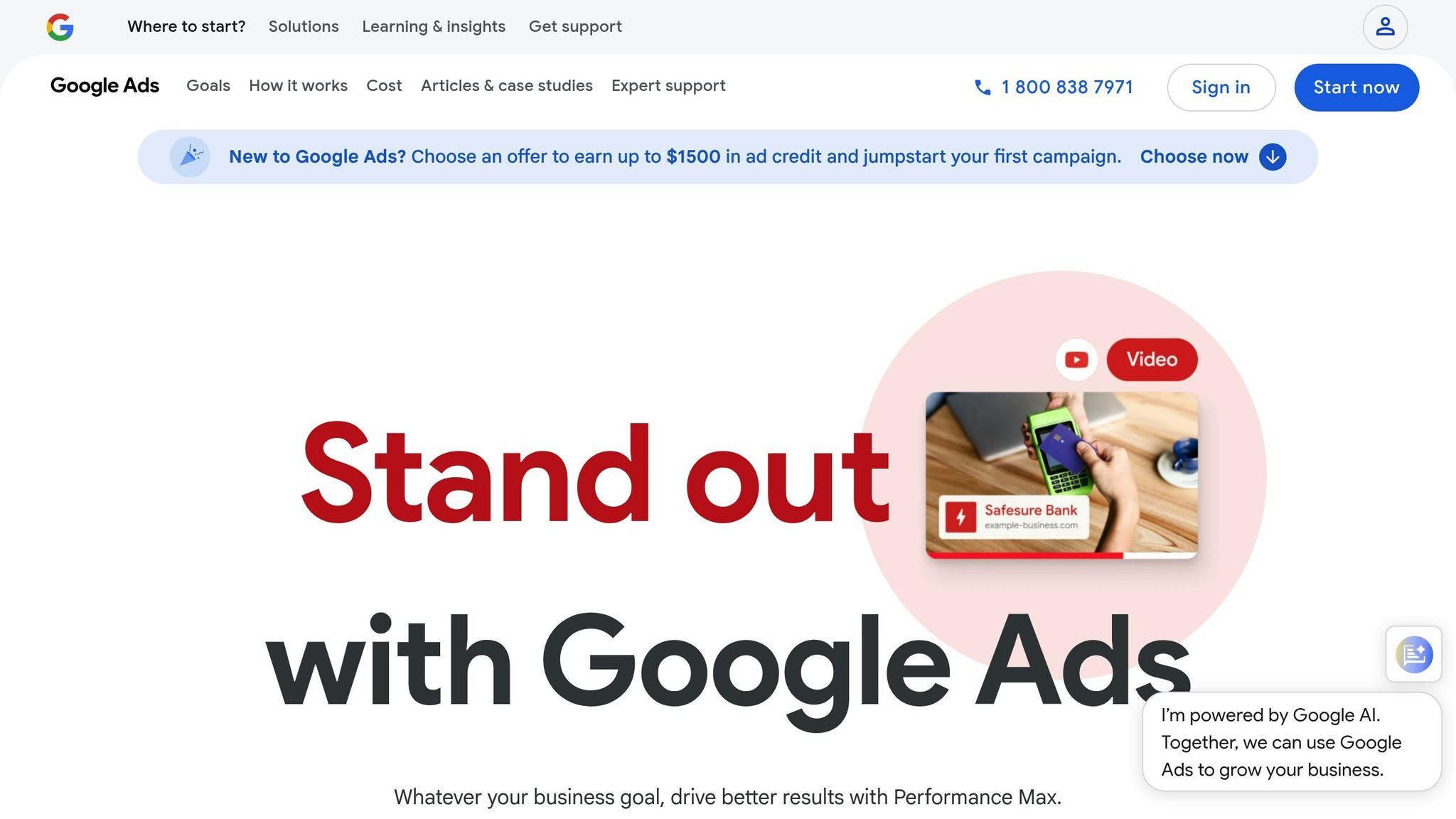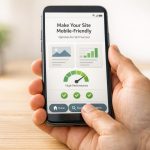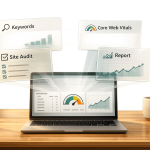

When deciding where to spend your marketing budget, Google Ads and Facebook Ads offer distinct advantages for South African SMEs. Google Ads connects you with people actively searching for your product or service, making it great for immediate sales or leads. Facebook Ads, on the other hand, helps you reach people based on interests and behaviours, making it ideal for building awareness and engaging potential customers over time.
Key Takeaways:
- Google Ads: Targets high-intent users searching for specific solutions. Best for quick conversions but often comes with higher costs.
- Facebook Ads: Targets users based on interests, demographics, and behaviours. Lower costs but requires longer campaigns to build interest.
Quick Comparison:
| Aspect | Google Ads | Facebook Ads |
|---|---|---|
| Targeting | Keywords, search intent | Demographics, interests |
| Cost Per Click (CPC) | Higher (e.g. R74.68 average) | Lower (e.g. R13.63 average) |
| Conversion Speed | Faster | Slower |
| Best For | Urgent needs, high-intent users | Brand awareness, visual content |
Both platforms can work well for SMEs, but the choice depends on your goals, audience, and budget. Many businesses find success by combining the two: using Google Ads for immediate results and Facebook Ads for long-term growth.
Google Ads vs. Facebook Ads (Which Is Better?)


How Google Ads and Facebook Ads Work
Building on the earlier introduction of these platforms, let’s dive into how each ad system operates in practice.
Google Ads: Search-Based Advertising
Google Ads runs on a search-intent model, meaning it connects with users right when they’re actively looking for something specific. For example, if someone types "wedding photographer Johannesburg" or "best pizza delivery Durban" into Google, your ad can show up at the top of the search results.
The system uses a keyword bidding process where you set a maximum cost per click. Google’s algorithm then determines ad placements based on your bid, the ad’s quality, and its relevance. Beyond search results, your ads can also appear on platforms like YouTube, Gmail, and across the Display Network on partner websites.
This approach means you’re reaching people who are already interested in what you offer. For instance, a Pretoria-based accounting firm advertising for "tax preparation services" is targeting users who are actively seeking that specific expertise. This often leads to higher conversion rates compared to other advertising methods.
In contrast, Facebook Ads takes a different route by focusing on creating demand rather than capturing it.
Facebook Ads: Interest-Based Advertising
Facebook Ads operates on an interest-driven model, using the vast amount of data collected from user activity – likes, shares, comments, followed pages, and even browsing habits – to build detailed interest profiles. This allows businesses to target users based on demographics, interests, and behaviours, rather than on specific search queries.
For example, a fitness studio in Cape Town could target women aged 25-45 who live within 10 kilometres, have shown interest in yoga or wellness, and frequently engage with health-related content.
Facebook’s ad ecosystem extends beyond its main platform to include Instagram, Messenger, and the Audience Network. These placements seamlessly integrate into users’ social media experiences, making ads feel more like part of the content they’re already engaging with. This is where Facebook excels: visual storytelling. Businesses can use images, videos, or carousel ads to showcase their products or services in a way that captures attention and feels natural within the social media environment.
Unlike Google Ads, Facebook Ads often introduce your business to people who might not yet realise they need your product or service. For example, a solar panel installer in Gauteng could use Facebook Ads to reach homeowners interested in sustainability and home improvement, sparking interest that might not have existed before.
Main Differences in Approach
The key distinction between these platforms lies in their focus: intent versus interest. Google Ads targets high-intent users who are actively searching for a solution, while Facebook Ads reaches users based on their interests and behaviours, often introducing them to new ideas or products.
Google Ads is ideal for immediate needs. For example, if someone searches "emergency plumber Bloemfontein", they likely need help urgently. Your Google Ad can meet that demand instantly, potentially turning a searcher into a customer in minutes.
Facebook Ads is better for building awareness and nurturing interest. A boutique clothing store in Stellenbosch, for instance, could use Facebook to showcase its latest collection to fashion-conscious women in the area, gradually building recognition and desire for their brand.
The customer journey differs as well. With Google Ads, the sales cycle is typically shorter – users search, click, and may make a purchase or enquiry almost immediately. Facebook Ads, on the other hand, often require multiple touchpoints to convert users, as they may need more time to become familiar with your brand and build trust.
These differences also influence budget strategies. Google Ads can deliver faster results but often comes with a higher cost per click, especially for competitive keywords. Facebook Ads generally offers lower cost-per-click rates, but campaigns may need to run longer to gain momentum and deliver meaningful results for your South African SME.
With these operational insights covered, let’s move on to exploring targeting options and audience reach tailored for South African SMEs.
Targeting Options and Audience Reach
For South African SMEs working with tight budgets, understanding targeting options is key. Google Ads and Facebook Ads both offer advanced targeting tools, but they function in distinct ways.
Google Ads Targeting Options
Google Ads excels at capturing users when they’re actively searching for something. This makes it incredibly effective for businesses looking to connect with potential customers at the exact moment they show interest.
At the heart of Google Ads is keyword targeting. You can cast a wide net with broad match keywords like "restaurant Cape Town" or go for precision with exact match phrases such as "halal restaurant Green Point". Using negative keywords can also help you avoid wasting money on irrelevant clicks. For instance, a high-end wedding venue in Durban might exclude terms like "cheap" or "budget" to focus on premium clients.
Location targeting is another strong feature, especially for businesses focused on specific areas. You can target users within a set radius, certain suburbs, or even entire provinces, making it ideal for South African SMEs catering to local markets.
Then there’s device and time targeting, which helps optimise your spend. In South Africa, where smartphones dominate internet access, mobile targeting is a must. You can also schedule ads to appear during peak times, like lunchtime for office workers or evenings for parents.
Google Ads also offers demographic targeting, letting you filter by age, gender, income, or even parental status. For example, a financial advisory firm in Johannesburg might focus on high-income earners aged 35-55, while a children’s clothing store could zero in on parents with young kids.
Facebook Ads Targeting Options
Facebook Ads takes a different route, leveraging its vast social data to segment audiences with precision.
With interest-based targeting, you can reach users based on what they like, share, or engage with. For example, a Cape Town yoga studio might target people interested in wellness, meditation, and healthy living. Similarly, a Stellenbosch craft brewery could focus on users who interact with local wine and beer content.
One of Facebook’s standout features is custom audiences. By uploading your existing customer email list, you can reconnect with previous buyers or promote special offers. This is particularly effective for South African retailers running seasonal sales.
Lookalike audiences take it a step further by finding new customers who share traits with your best clients. For instance, if your Johannesburg accounting firm has a database of successful small business clients, Facebook can help identify others with similar profiles across the country.
Behavioural targeting digs deeper, focusing on actions like purchasing habits, device usage, or travel patterns. A Durban-based tourism operator might target frequent domestic travellers, while a luxury car dealership could focus on users engaging with high-end brands.
Another unique option is life events targeting, which allows you to reach people during significant moments like becoming new parents, graduating, or moving to a new home. This can be invaluable for businesses like insurance providers, baby stores, or home improvement services.
South African Audience Reach: Google vs Facebook
When it comes to reach, each platform offers distinct strengths within the South African market. Google dominates search behaviour, with millions of daily searches across multiple languages and regions. Its ability to connect with users across diverse income levels and locations makes it a powerful tool for businesses targeting broad or niche markets.
On the other hand, Facebook’s reach in South Africa is massive, serving as one of the country’s top social platforms. Instagram, which shares Facebook’s advertising system, is particularly popular among younger and urban audiences, offering strong engagement opportunities.
| Targeting Feature | Google Ads | Facebook Ads |
|---|---|---|
| Primary Focus | Search intent and keywords | Interests and behaviours |
| Geographic Precision | Radius, cities, provinces | Fine-tuned location & behaviour |
| Audience Data Source | Search history and activity | Social media activity and profiles |
| Best for New Customers | High-intent searchers | Interest-based discovery |
| Budget Efficiency | Higher cost, faster results | Lower cost, longer nurturing |
| Mobile Targeting | Strong mobile search reach | Excellent mobile social engagement |
Language targeting is another factor to consider in South Africa’s multilingual landscape. Google Ads allows you to target searches in Afrikaans, isiZulu, isiXhosa, and other local languages, while Facebook lets you focus on users’ language preferences and interests.
The urban-rural divide also plays a role. Google Ads is effective for reaching users in rural areas through relevant search terms, while Facebook thrives in urban hubs where social media usage is more concentrated. However, Facebook’s reach in townships and smaller cities continues to grow.
Lastly, cost considerations differ between the two platforms. Google Ads often requires higher budgets due to competitive keyword bidding, especially in major metros like Johannesburg and Cape Town. Facebook Ads, on the other hand, offers more flexibility, allowing businesses to start small and still see results.
Costs and Budget Requirements
Understanding the cost structures of Google Ads and Facebook Ads is essential for South African SMEs looking to maximise their return on investment. Each platform offers distinct pricing models, which can significantly affect your overall advertising strategy, especially for businesses with limited budgets.
Google Ads: Cost and ROI
Google Ads uses a pay-per-click (PPC) model, where advertisers bid on keywords to secure ad placements. In South Africa, the cost per click (CPC) largely depends on your industry and the competitiveness of your chosen keywords. For instance, highly competitive sectors like finance or insurance typically come with higher CPCs compared to less competitive fields.
To get the most out of Google Ads, optimising your campaign is key. A higher Quality Score – Google’s metric for ad relevance and performance – can reduce your CPC, making your ads more cost-effective over time. This means investing in well-targeted ad copy and fine-tuning your landing pages is not just beneficial but necessary for improving your campaign’s efficiency.
However, Google Ads does require a minimum daily budget to compete effectively, especially in competitive markets. While the upfront costs may be higher, the platform’s ability to deliver high-intent clicks often results in better conversion rates, which can justify the investment.
Facebook Ads: Cost and Budget Flexibility
Facebook Ads stand out for their budget-friendly approach, making them a popular choice for smaller South African businesses. The platform’s lower CPC and competitive cost per thousand impressions (CPM) allow businesses to reach a broader audience without breaking the bank.
For example, a Cape Town-based SME could use Facebook Ads to promote a special offer while simultaneously building a loyal following. The platform’s flexibility also allows businesses to adjust their spending based on campaign objectives. Awareness campaigns, for instance, are often more affordable than conversion-focused ads, giving SMEs the freedom to align their strategies with their financial constraints.
Cost Comparison in Rands
When comparing the two platforms, Google Ads often generates fewer but higher-quality clicks due to its focus on user intent. Facebook Ads, on the other hand, typically delivers a larger number of clicks and greater brand exposure, though with slightly lower conversion quality. Here’s a quick breakdown of how the platforms compare:
| Budget Aspect | Google Ads | Facebook Ads |
|---|---|---|
| Minimum Daily Spend | Requires a moderate daily spend | Works well even with a modest budget |
| Budget Flexibility | Less adaptable for tight budgets | Highly flexible for smaller budgets |
| Cost Per Click | Generally higher | Typically lower |
| Conversion Quality | Higher due to user intent | Lower but offset by higher click volume |
| ROI Potential | Faster ROI for high-intent searches | Gradual ROI through audience engagement |
Seasonal and Geographic Factors
Ad costs can vary throughout the year. For example, Google Ads often become more expensive during peak shopping seasons like Black Friday or the December holidays. Facebook Ads tend to have more stable pricing, making them easier to plan for in terms of budgeting.
Geographic targeting also plays a role in cost variations. Running ads in economic hubs like Gauteng or the Western Cape may be more expensive than in smaller regions. However, these areas often offer a higher potential customer value, which can make the added expense worthwhile.
For many SMEs in South Africa, starting with Facebook Ads can be a practical way to test the waters of digital advertising. With its low entry costs, businesses can experiment and refine their messaging and targeting strategies before scaling up to platforms like Google Ads, which demand more upfront investment and research.
sbb-itb-6f8605a
Campaign Goals and Best Use Cases
Building on insights about targeting and costs, it’s crucial to align your campaign goals with the unique strengths of each platform. Different platforms excel at different stages of the customer journey, so understanding where they fit best can significantly impact your results.
When to Use Google Ads
Google Ads shines when you’re targeting high-intent customers. It connects you with people actively searching for solutions, making it ideal for businesses prioritising quick conversions.
If lead generation is your goal, Google Ads is an excellent choice. For example, professional services like lawyers, accountants, or plumbers benefit greatly because potential clients often search for these services during urgent situations. A tax consultancy in Johannesburg running ads for "tax consultant near me" is likely to see better results than attempting to generate awareness through social media.
For e-commerce businesses, Google Ads is a powerful tool. When someone searches for "running shoes Cape Town" or "laptop repair Durban", they are closer to making a purchase decision than someone casually browsing Facebook. While the cost per click might be higher, the intent behind these searches often leads to stronger conversion rates.
Service-based and B2B companies that need immediate customer action also perform well with Google Ads. The platform’s search-driven approach ensures you connect with users actively looking for solutions.
When to Use Facebook Ads
Facebook Ads are perfect for building awareness and engaging with audiences who might not be actively searching for your product but could develop interest once they discover it. This makes Facebook a great option for businesses looking to educate or create demand rather than capture it.
Brand awareness campaigns thrive on Facebook. For instance, a startup offering eco-friendly cleaning products can use Facebook to reach environmentally conscious consumers who may not yet realise they need alternatives to traditional cleaners.
Businesses with visual products like fashion retailers, restaurants, interior designers, or fitness coaches can take advantage of Facebook’s image and video-heavy platform to grab attention and inspire action.
Facebook also excels in community building and customer engagement. Businesses like fitness studios, beauty salons, or local restaurants can use the platform to strengthen relationships with their customers. Sharing behind-the-scenes content, customer stories, or exclusive offers helps keep your brand in mind between purchases.
Event promotion is another area where Facebook performs well. Whether you’re hosting a workshop, a sale, or a community event, Facebook’s social sharing features can amplify your reach and encourage attendance.
For businesses with longer decision-making cycles, retargeting campaigns on Facebook are invaluable. For example, furniture stores or travel agencies can reconnect with website visitors who didn’t make an immediate purchase, keeping their brand visible during the research phase.
These scenarios demonstrate how aligning your platform choice with specific business goals can maximise campaign effectiveness.
Matching SME Goals with Platform Features
Choosing the right platform starts with understanding your customers’ buying journey and how they prefer to discover products or services.
- Google Ads is your go-to if your business addresses urgent needs or relies on customers actively searching for your services. This applies to most professional services, emergency repairs, specific product purchases, and local services. While the cost per click may be higher, the shorter sales cycles and higher conversion rates often justify the investment.
- Facebook Ads is ideal for creating awareness, building a community, or showcasing visually appealing products. Lifestyle brands, restaurants, entertainment venues, and businesses selling products people don’t typically search for can benefit from Facebook’s ability to spark interest.
- Budget considerations are also important. If you’re working with limited funds, Facebook’s lower entry costs make it easier to test different messages and audiences. On the other hand, Google Ads might require a higher upfront investment but delivers quicker results.
- Industry factors also play a role. Traditional service-based businesses often see better results with Google Ads, while creative industries, hospitality, and lifestyle brands tend to perform better on Facebook.
- Geographic targeting capabilities differ as well. Google Ads is great for capturing local searches with high intent, making it ideal for businesses focused on specific areas. Facebook, however, excels at demographic and interest-based targeting, which is better suited for businesses looking to reach broader audiences or expand awareness beyond their immediate location.
Many SMEs find success by using both platforms strategically. By combining Google Ads for high-intent searches with Facebook Ads for brand building and engagement, you can create a well-rounded advertising strategy that addresses various stages of the customer journey.
Pros and Cons of Google Ads vs Facebook Ads
When it comes to online advertising, no platform is perfect. Each has its own strengths and challenges that can influence where you decide to invest your marketing budget. Let’s break down the key advantages and drawbacks of Google Ads and Facebook Ads, especially in the South African context.
Main Benefits of Each Platform
Google Ads is fantastic for capturing customers who are ready to buy. Think about someone searching for "wedding planner in Pretoria" – they’re likely looking for immediate help. Google Ads connects businesses with people who have clear intent, making it a powerful tool for driving quick conversions.
It also offers precise targeting. You can tailor your campaigns by keywords, locations, and even the time of day to maximise returns on every rand spent. Combine that with Google’s reach across South Africa, and you’ve got a platform that can deliver strong results for businesses of all sizes.
Facebook Ads, on the other hand, shines when it comes to building awareness and sparking interest. Its visual format is perfect for showcasing products, telling stories, and engaging with audiences in a more casual, approachable way.
The platform’s targeting capabilities are also impressive. You can zero in on specific demographics, interests, behaviours, and even life events. For instance, a wedding photographer in Cape Town can target engaged couples in the area, something traditional search advertising can’t offer. Plus, Facebook Ads are generally more affordable, with an average cost per click of just R13.63 compared to Google’s R74.68. This lower cost makes it easier for small businesses to experiment and grow their audience without breaking the bank.
| Platform | Key Strengths |
|---|---|
| Google Ads | High purchase intent, precise keyword targeting, quick results, strong local reach |
| Facebook Ads | Affordable, visually engaging, detailed demographic targeting, ideal for brand building |
Drawbacks to Consider
Google Ads can be pricey, especially in competitive industries. Keywords like "insurance" can cost as much as R971.72 per click, which can quickly eat into the budgets of smaller businesses. The platform also has a steep learning curve. To succeed, you need to master keyword research, bidding strategies, and ongoing optimisation – something many business owners underestimate.
Competition is another hurdle. Larger businesses with bigger budgets often dominate popular search terms, making it tough for newcomers to gain visibility. And even when you do get your ad in front of users, only about 20% of people click on sponsored results, as most prefer organic search results.
Facebook Ads, while cheaper, often struggle with lower purchase intent. People scrolling through Facebook are usually there for entertainment or social interaction, not to shop. This means you’ll likely face longer sales cycles and need multiple interactions to convert a viewer into a customer.
Another challenge is the lack of keyword targeting. Unlike Google, Facebook doesn’t let you target users searching for specific terms like "emergency electrician." Instead, you have to rely on demographic and interest-based targeting, which can make it harder to reach people with immediate needs.
Ad fatigue is also a concern. With so much content on Facebook, users can quickly grow tired of seeing the same ads repeatedly. This can lead to declining effectiveness and higher costs – while the average cost per action is R330.57, it can rise significantly if your ads start to blend into the background.
| Platform | Main Drawbacks |
|---|---|
| Google Ads | High costs (avg. R74.68 CPC), complex setup, fierce competition, limited organic clicks |
| Facebook Ads | Lower purchase intent, no keyword targeting, risk of ad fatigue, longer conversion cycles |
Local Examples of Pros and Cons
For South African small and medium businesses, the choice between Google Ads and Facebook Ads often comes down to the nature of the business and its goals.
A Johannesburg-based emergency plumbing service is a great example of when Google Ads outshines Facebook. When a geyser bursts at 2 AM, people are more likely to search Google for immediate help rather than scrolling through Facebook. While the cost per click may be higher, the potential revenue from a single service call makes it worthwhile.
On the other hand, a boutique clothing store in Cape Town might find Facebook Ads more effective. Fashion purchases are often driven by visual inspiration rather than urgency. Facebook’s lower cost per click allows the store to showcase its products and build brand recognition without overspending. However, the challenge lies in converting engagement into actual sales, which may take time.
For a Durban-based accounting firm, both platforms offer unique opportunities. Google Ads can capture searches for tax-related services, while Facebook Ads can help build trust and stay top of mind for potential clients. However, turning Facebook engagement into appointments often requires more effort, such as follow-up campaigns or retargeting.
These examples show why many South African SMEs eventually adopt both platforms as part of their strategy. The trick lies in knowing which platform aligns best with your business goals and adjusting your approach accordingly.
Conclusion: Choosing the Right Platform for Your SME
Main Points Summary
The best advertising platform for your small or medium-sized enterprise (SME) depends on your specific goals and business needs. Google Ads is ideal for reaching customers who are actively searching for solutions, making it a great fit for urgent services, local offerings, or products that people need immediately – like emergency repairs or legal consultations. On the other hand, Facebook Ads shines when it comes to cost-effective brand building, visually engaging campaigns, and targeting specific demographics, although it tends to attract lower purchase intent.
When comparing costs, Facebook generally offers a lower price per action, but its campaigns often require more time to convert interest into actual sales. Google, with its search-based approach, delivers quicker results but may come with higher upfront costs. These differences highlight the importance of aligning your advertising strategy with your business’s unique requirements.
Custom Strategies for South African SMEs
For South African SMEs, success lies in crafting strategies that reflect local market dynamics, consumer preferences, and financial realities. Many businesses find value in combining both platforms – using Google Ads to drive immediate conversions and Facebook Ads to build brand awareness over time.
Budget allocation is key. If your focus is on generating quick sales, prioritise spending on Google Ads. However, if you’re looking to establish long-term brand recognition, consider investing more heavily in Facebook campaigns.
To maximise your return, track meaningful metrics such as conversions, customer acquisition costs, and customer lifetime value. Avoid relying solely on vanity metrics like clicks or impressions. These actionable insights will help you fine-tune your campaigns and optimise your budget.
Final Recommendations
Start small. Choose one platform, learn how to use it effectively, and then expand. Test your campaigns with modest budgets and keep a close eye on your cost per acquisition. If your campaign costs outweigh the value of the customers you’re acquiring, it’s time to adjust your targeting or consider switching platforms.
Think about your long-term goals. Google Ads offers instant visibility and results but requires consistent spending to maintain momentum. Facebook Ads, while slower to show returns, helps build a strong brand presence that can continue to benefit your business even after campaigns end.
Ultimately, success comes down to understanding your audience, crafting compelling messages, and continuously refining your approach. By focusing on delivering real value to your customers, you can turn your advertising efforts into sustainable growth for your SME. Make sure your platform choices align with both your short-term needs and long-term aspirations.
FAQs
How can small businesses in South Africa use Google Ads and Facebook Ads together for better results?
To get the most out of your marketing efforts, pairing Google Ads with Facebook Ads can be a game-changer. Google Ads is perfect for reaching people who are actively searching for what you offer, while Facebook Ads shines when it comes to creating awareness and building meaningful connections with your audience.
Using both platforms together allows you to tap into different stages of the customer journey. For instance, you can leverage Google Ads to attract potential customers to your website, then follow up with personalised Facebook Ads to re-engage those visitors. This mix creates a well-rounded strategy that supports both your objectives and your budget.
Which types of South African businesses are better suited for Google Ads versus Facebook Ads?
When deciding between Google Ads and Facebook Ads, the right choice often hinges on your business type and marketing goals. For South African businesses, Google Ads is a strong option for those offering products or services that customers actively search for – think plumbing services, legal advice, or home renovations. Since Google Ads aligns with user search intent, it’s a powerful tool for capturing leads right when people are looking for solutions.
In contrast, Facebook Ads shines for businesses focused on building brand awareness or targeting niche audiences based on interests. For example, boutique clothing stores, artisanal food brands, or fitness studios can tap into Facebook’s detailed demographic and interest-based targeting. This allows them to connect with potential customers who may not yet be searching directly but are drawn to visually engaging content.
The ideal platform depends on your specific business needs, audience, and goals. In many cases, combining Google Ads and Facebook Ads strategically can help you broaden your reach and achieve better results.
What should South African SMEs consider when budgeting for Google Ads or Facebook Ads?
When planning a budget for Google Ads or Facebook Ads, South African SMEs need to weigh a few key factors to get the most value from their marketing spend. Think about the competition in your industry, the size of your target audience, and how quickly you aim to see results. For instance, Google Ads often generates leads faster, while Facebook Ads might be a better fit for creating brand awareness at a lower cost.
Typically, small businesses in South Africa dedicate 10%–12% of their annual revenue to marketing. This could translate to budgets ranging from R10 000 to R50 000, depending on the size of the business and its objectives. It’s equally crucial to align your budget with the customer journey and decide whether your strategy leans on inbound or outbound marketing. By keeping these elements in mind, SMEs can craft a strategy that delivers a strong return on investment.








